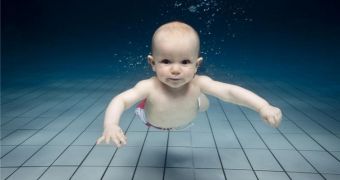According to a new study from the Norwegian University of Science and Technology (NTNU), babies who are taught how to swim from a very early age tend to exhibit a number of advantages later on in life, even when they turn five years old. The research team says that the small ones tend to have better balance, and to be overall better at grasping at things, than their peers that did not learn how to swim at a very early age. The differences are marked, the scientists say, quoted by AlphaGalileo.
The group behind this research was led by NTNU psychology professor Hermundur Sigmundsson, who worked closely with Lancaster University professor of psychology Brian Hopkins. The two managed to prove that babies who swim tend to have more balance than their peers who did not learn this practice. They can also move a lot faster, with more efficiency, and for longer times than other infants or small children, the group adds. “Practice makes perfect,” Sigmundsson says.
“We saw very clearly that baby swimmers were the best in exercises that related to balance and the ability to reach for things,” the expert adds, explaining that the research took place in Iceland. It featured a number of 19 baby swimmers, and an addition group of 19 infants, that was used as a control group. Members of the second group had not taken swimming lessons by the start of the study. “It's incredibly exciting that specific training for young babies has an effect later in life. Development is a dynamic interplay between maturation, growth, experience and learning. Our study shows that we must never underestimate the learning aspect,” he continues.
“Water is as important to Icelanders as snow is for Norwegians. A typical Icelander swims on average once or twice a week, and there is great deal of interest in baby swimming. I know an instructor who has been teaching baby swimming for 20 years. He had a great deal of information about children who have participated in swimming courses. So it was natural for us to conduct the study in Iceland,” says Sigmundsson of the reasons for which the team chose this country as the test site. Details of the investigation appear in the May issue of the respected scientific journal Child: Care Health and Development.

 14 DAY TRIAL //
14 DAY TRIAL //